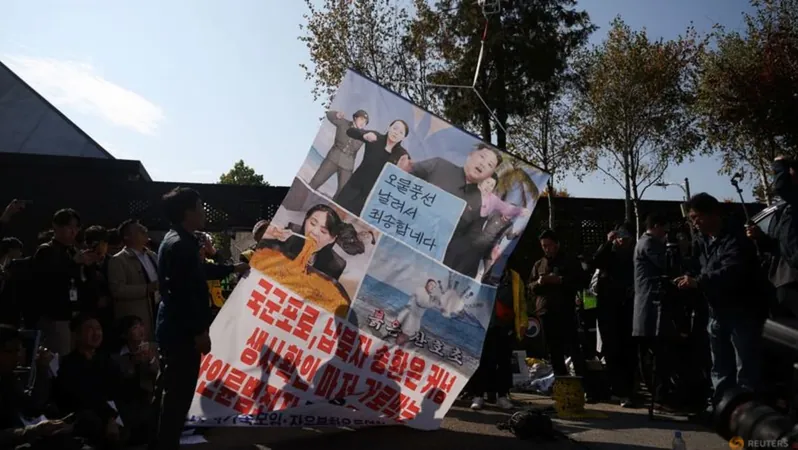
South Korea Thwarts Balloon Campaign Against North Korea Amid Rising Tensions
2024-10-31
Author: Sarah
In a significant development near the inter-Korean border, South Korean authorities have successfully blocked an attempt by families of individuals believed to have been kidnapped by North Korea to launch balloons carrying critical leaflets into the North. The incident occurred on October 31 in the city of Paju, underscoring the escalating tensions between the two nations, which are at their most strained in years.
This failed initiative is set against the backdrop of North Korea's aggressive balloon campaigns this year, where it has dispatched thousands of balloons filled with trash and propaganda into South Korea. These actions are framed by Pyongyang as retaliation against similar efforts from the South, which have included balloons containing leaflets that criticize the North’s regime, bibles, and USB drives brimming with popular K-pop music and dramas.
Choi Sung-ryong, the leader of the group advocating for the families of the abducted, reported that their vehicle was intercepted by a group of police officers who confiscated their materials. Following this disruption, Choi expressed intentions to seek official permission for a future launch.
Local authorities in Paju, aligned with the prohibition of such anti-North Korean initiatives, have issued strict warnings to those involved in distributing these critical leaflets. Mayor Kim Kyung-il emphasized, “If you disobey the order, we will punish you according to the law.”
Despite a landmark constitutional court ruling last year that overturned a ban on leaflet launches as a violation of free speech, regional authorities have increasingly sought to restrict the practice due to growing tensions and concerns for public safety in border towns. Residents of Paju are particularly anxious, with some voicing strong opposition toward any provocative actions that could heighten risks in their community.
Park Kyung-ho, a local farmer, articulated the sentiments driving resident fears, stating, “This is a matter of survival for us who came out here.” Another resident, 72-year-old Kim Geun-in, highlighted the widespread opposition, emphasizing, “I want anti-North Korean leaflets and the loudspeakers to stop. I feel North Korea will stop only if South Korea does.
As tensions mount, South Korea has resumed loudspeaker broadcasts directed at the North—an action that mirrors North Korea’s own use of loudspeakers—adding to the noise and disruption experienced by those living in border areas. This aggravation points to a fragile state of affairs along a border that remains one of the most heavily militarized in the world.
The Korean peninsula, which remains technically in a state of war following a conflict that ended in an armistice rather than a peace treaty in 1953, continues to experience cycles of provocation and retaliation that leave its citizens on edge. As the situation evolves, both governments face pressure to manage public sentiment and international relations carefully.



 Brasil (PT)
Brasil (PT)
 Canada (EN)
Canada (EN)
 Chile (ES)
Chile (ES)
 España (ES)
España (ES)
 France (FR)
France (FR)
 Hong Kong (EN)
Hong Kong (EN)
 Italia (IT)
Italia (IT)
 日本 (JA)
日本 (JA)
 Magyarország (HU)
Magyarország (HU)
 Norge (NO)
Norge (NO)
 Polska (PL)
Polska (PL)
 Schweiz (DE)
Schweiz (DE)
 Singapore (EN)
Singapore (EN)
 Sverige (SV)
Sverige (SV)
 Suomi (FI)
Suomi (FI)
 Türkiye (TR)
Türkiye (TR)